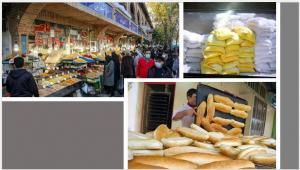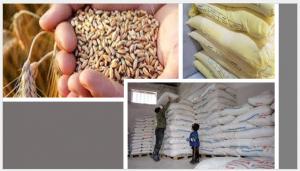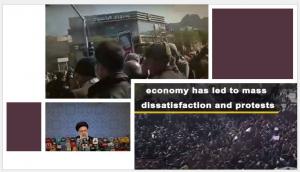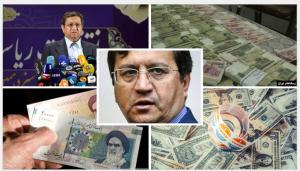(Video) In Iran, the regime seeks economic solutions in plundering the people

on April 8, Iranian regime President Ebrahim Raisi said revoking the country’s subsidized currency exchange rate will not cause a shock to Iran’s economy. Less than a month later, rising inflation and skyrocketing prices including bread.

The price of wheat has jumped 100 percent compared to three years ago. Flour prices have jumped between 500 and nearly 700 percent. The price of ordinary sandwich bread has increased by a whopping thirteen-fold.

Ebrahim Raisi is concerned about the recent outburst of anti-regime protests in various cities across the country. To increase state subsidies to four million rials for deprived Iranian families. This will resolve nothing in the face of skyrocketing price.
Flour prices have jumped between 500 and nearly 700 percent. The price of ordinary sandwich bread has increased by a whopping thirteen-fold.
Less than a month later, rising inflation and skyrocketing prices are leaving tens of millions of people unable to purchase their basic necessities, including even bread.
The price of wheat has jumped 100 percent compared to three years ago. Flour prices have jumped between 500 and nearly 700 percent. The price of ordinary sandwich bread has increased by a whopping thirteen-fold.
Cooking oil prices have increased by more than 750 percent. Rice has seen a price hike of 130 percent in the past six months alone. Medicine is costing an average of 1,000 percent higher.
On housing prices, state media are reporting that the rise in rent and mortgage rates are “breaking the tenants’ backs.” Bread has become so expensive and even scarce that state media are warning that “the French revolution [was triggered] with a rise in bread prices.”
In response, Raisi is now claiming that the recent unbridled rise in prices will be controlled with an increase of three to four million rials in subsidies for the country’s deprived families, and there’s nothing to worry about.
There are two explanations here:
First: Allocating subsidized currency to purchasing basic goods for Iran’s previous fiscal year (March 2020 to March 2021) needed around $8 billion.
Therefore, by eliminating this subsidized currency the Raisi cabinet literally pocketed $8 billion that can be used to advance the regime’s nuclear weapons program, missile and drone development, fuel regional terrorism, and beef up their domestic crackdown apparatus.
If we also take into consideration the skyrocketing price of basic goods, according to the state-run Eghtesad-e Ayande daily, the Raisi cabinet has stolen at least $18 billion from the Iranian people.
Hojatollah Abdolmaleki, the regime’s Labor Minister, said quite brazenly on May 14 that the wave of recent price hikes will provide around $1.27 billion per month to the Raisi government.
This theft in plain sight has reached a point that even Hossein Raqfar, an economist linked to the regime, describes it on May 15 as “another example of theft and plundering in Iran’s economy” that is aimed at “compensating the [regime’s] budget deficit.”
To further shed light on the scope of this calamity, Gholam Ali Jafarzadeh Emenabadi, a former member of the regime’s Majlis (parliament), said “anything else is simply made-up stories!”
Second: Raisi, concerned about the recent outburst of anti-regime protests seen in various cities across the country, is vowing to increase state subsidies to four million rials for deprived Iranian families. This, however, will resolve nothing in the face of skyrocketing prices.
“You’re giving me four million rials per month but billing me 50 million rials in monthly expenses!” said one taxi driver to a reporter of the state-run Tasnim news agency on May 15.
As a result, by eliminating the state-subsidized currency used to provide the people’s basic necessities, the regime is pocketing far more than they’re providing people in “increased” subsidies.
Iran’s currency, the rial, is nosediving. As a result, the actual monetary value of the pledged four million rials in subsidies is decreasing as we speak.
Inflation is skyrocketing. Therefore, rising prices are making the four million rials in subsidies look all the more meaningless.
Furthermore, Raisi refuses to explain that if his cabinet cannot provide for the necessary subsidized exchanged currency, how will it provide the promised four million rials in subsidies to the country’s deprived population?
This has not been stipulated in this year’s fiscal budget plan and the source to provide for such an initiative remains a mystery to this day.
To make a long story short, the only source is none other than printing more money. Abdolnnaser Hemmati, the regime’s former Central Bank chief, acknowledged that Raisi’s cabinet has to this day printed 1.42 quadrillion rials (around $4.67 billion) in banknotes and “deserves to be crowned as the sultan of money-printing.”
This is another fundamental reason behind the unprecedented rise in inflation that is depleting the people’s purchasing power as never before.
The state-run Jomhouri Eslami daily wrote on May 15: “Continuing to provide your subsidies is tantamount to leaving your stained surgical knife in the body of a patient, leaving the individual to suffer from further illnesses!”
Shahin Gobadi
NCRI
+33 6 61 65 32 31
email us here
Mortazavi : One of the main indexes for each nation to learn about where that country is heading is to see the social gaps between different classes.
Legal Disclaimer:
EIN Presswire provides this news content "as is" without warranty of any kind. We do not accept any responsibility or liability for the accuracy, content, images, videos, licenses, completeness, legality, or reliability of the information contained in this article. If you have any complaints or copyright issues related to this article, kindly contact the author above.

![This theft in plain sight has reached a point that even Hossein Raqfar, an economist linked to the regime, describes it on May 15 as “another example of theft and plundering in Iran’s economy” that is aimed at “compensating the [regime’s] budget deficit.”](https://img.einpresswire.com/medium/306685/19-5-2022-bread-4.jpeg)
